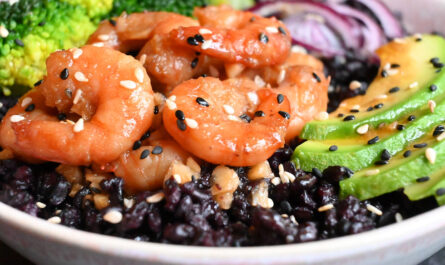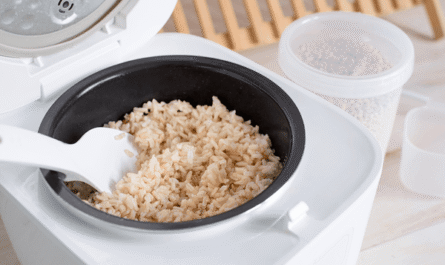Black rice, often referred to as ‘forbidden rice,’ is not just an exotic grain with a unique color. It is a powerhouse of vitamins and minerals that can significantly contribute to a healthy diet. As sushi lovers explore diverse grains beyond traditional white rice, black rice emerges as a delicious and nutritious alternative. In this article, we will delve into the black rice vitamins and minerals, offering insights into how they can enhance your overall well-being.

The Nutritional Profile of Black Rice
Understanding the nutritional composition of black rice is crucial for appreciating its health benefits. Black rice is rich in essential vitamins and minerals that play significant roles in our body’s functioning. These nutrients include iron, vitamin E, and a range of antioxidants that contribute to its superfood status.
Iron Content in Black Rice
Iron is an essential mineral that aids in the production of hemoglobin, a protein in red blood cells that carries oxygen throughout the body. Black rice is a good source of iron, making it beneficial for individuals looking to prevent or combat anemia. Incorporating black rice into your diet can help maintain healthy iron levels, supporting overall energy and vitality.
Vitamin E: A Powerful Antioxidant
Vitamin E found in black rice acts as a powerful antioxidant, protecting cells from damage caused by free radicals. This nutrient is vital for maintaining healthy skin, eyes, and strengthening the immune system. Consuming black rice regularly can contribute to a glowing complexion and robust immune health.
Antioxidant Richness in Black Rice
Black rice is renowned for its high levels of antioxidants, particularly anthocyanins, which give the rice its dark hue. These antioxidants have anti-inflammatory properties and are linked to reducing the risk of chronic diseases, including heart disease and certain cancers.
Anthocyanins: Nature’s Defense Mechanism
Anthocyanins, the pigments responsible for the deep black color of the rice, are potent antioxidants that help combat oxidative stress. Research suggests that diets rich in anthocyanins can lower the risk of cardiovascular diseases and improve overall heart health. Including black rice in your meals can be a tasty way to harness these protective benefits.
Anti-Inflammatory Benefits
The anti-inflammatory properties of black rice make it an excellent dietary choice for reducing inflammation in the body. Chronic inflammation is a contributor to numerous health issues, including arthritis and metabolic syndrome. By incorporating black rice into your diet, you can take proactive steps towards reducing inflammation and promoting long-term health.
Black Rice and Weight Management
For those seeking to manage their weight, black rice can be an effective dietary addition. The grain is high in dietary fiber, which promotes a feeling of fullness and aids in digestion. This can help regulate appetite and prevent overeating, making it easier to maintain a healthy weight. For more tips on including black rice in a weight-conscious diet, visit Black Rice for Weight Loss.
Fiber: A Key to Satiety
The dietary fiber in black rice not only supports digestive health but also contributes to a sense of fullness after meals. This can help curb the urge to snack between meals, supporting weight management efforts. By making black rice a staple in your diet, you can enjoy its satiating effects while reaping its nutritional benefits.
Incorporating Black Rice into Your Diet
Integrating black rice into your meals can be a rewarding culinary adventure. Its nutty flavor and chewy texture make it a versatile ingredient in various dishes. From sushi rolls to salads, black rice can add a touch of elegance and nutrition to your plate. Check out creative recipes like Black Rice Soup Recipe for inspiration.
Delicious Black Rice Recipes
Experimenting with black rice recipes can be a delightful way to enjoy its benefits. Whether you prepare a simple black rice salad or incorporate it into sushi, the possibilities are endless. For those new to cooking with black rice, starting with a basic pilaf or stir-fry can be a great introduction to its unique flavor and texture.
Cooking Tips for Perfect Black Rice
Cooking black rice requires a bit of patience, as it typically takes longer to cook than white rice. To achieve the perfect texture, rinse the rice thoroughly before cooking to remove excess starch. Use a rice cooker or follow the package instructions for stovetop cooking. Patience will be rewarded with a delicious and nutritious meal.

FAQs
What are the main vitamins in black rice?
Black rice is rich in vitamin E and contains other essential vitamins like B-vitamins, which are crucial for energy metabolism and maintaining healthy skin.
Is black rice gluten-free?
Yes, black rice is naturally gluten-free, making it a suitable choice for individuals with gluten sensitivities or celiac disease.
How can I store black rice?
Store black rice in an airtight container in a cool, dry place to maintain its freshness and nutritional value. For extended storage, consider refrigerating or freezing the rice.
For additional insights on the benefits of black rice, you can explore further at Black Rice Benefits.
This article contains affiliate links. We may earn a commission at no extra cost to you.




